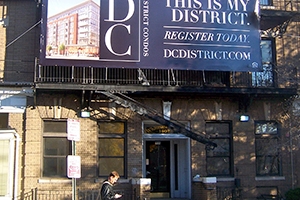Research
SPA Professor to Lead Team of Researchers to Explore Health Impacts of Urban Gentrification

American University School of Public Affairs associate professor Derek Hyra was recently selected to head a research team that will explore efforts to reduce health disparities in two communities going through gentrification – the Shaw neighborhood in the northwest quadrant of Washington, D.C., and the city of Orange, N.J.
“There has been little research aimed at understanding the ways in which gentrification influences health outcomes,” said Hyra, who is also the director of SPA’s Metropolitan Policy Center. “This effort will investigate and explain various types of stressors experienced by vulnerable populations who remain in communities as they transform economically.”
In the three-year project funded by the Robert Wood Johnson Foundation’s (RWJF) Interdisciplinary Research Leaders (IRL) program, Hyra will work with Mindy Fullilove, a professor at The New School in New York City, and Dominic Moulden, the resource organizer for Organizing Neighborhood Equity, known as “ONE DC.” The RWJF’s IRL program pairs two experienced researchers with an established community leader to work collaboratively on issues involved with promoting a culture of health.
“This program gives our fellows the tools to make their work even more relevant and potent,” says Michael Oakes, director of Interdisciplinary Research Leaders and professor in the School of Public Health at the University of Minnesota. “We were overwhelmed by the commitment, diverse perspectives and innovative ideas in our applicant pool and are very excited to work with this first group to put research into action and create a lasting, on-the-ground impact.”
Hyra and team will look into how people in these transitioning communities from different socio-economic backgrounds interact and how those relationships affect the health of long-term residents, particularly those who are low-income. The team is one of 15 across the country selected by the foundation to explore innovations related to early childhood, housing, community development, and health.
The Metropolitan Policy Center, which Hyra leads is working to understand the intersections among various social, economic and political processes, operating at various levels, that influence metropolitan and urban landscapes. The center employs mixed methods to uncover, explain, and propose solutions to important 21st century metropolitan and urban challenges including: affordable housing, economic development, racial and ethnic diversity, social service provision, and urban and regional governance.
To learn more, visit http://www.american.edu/spa/metro-policy/.
